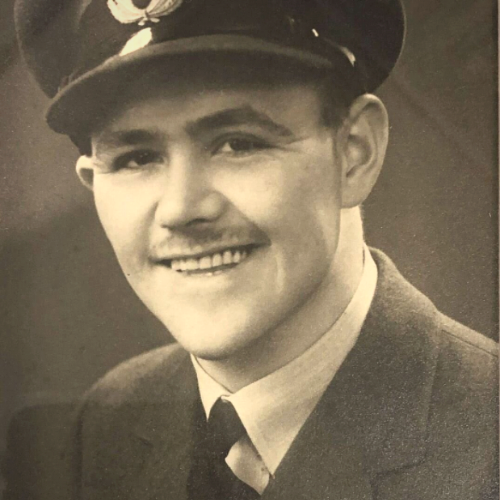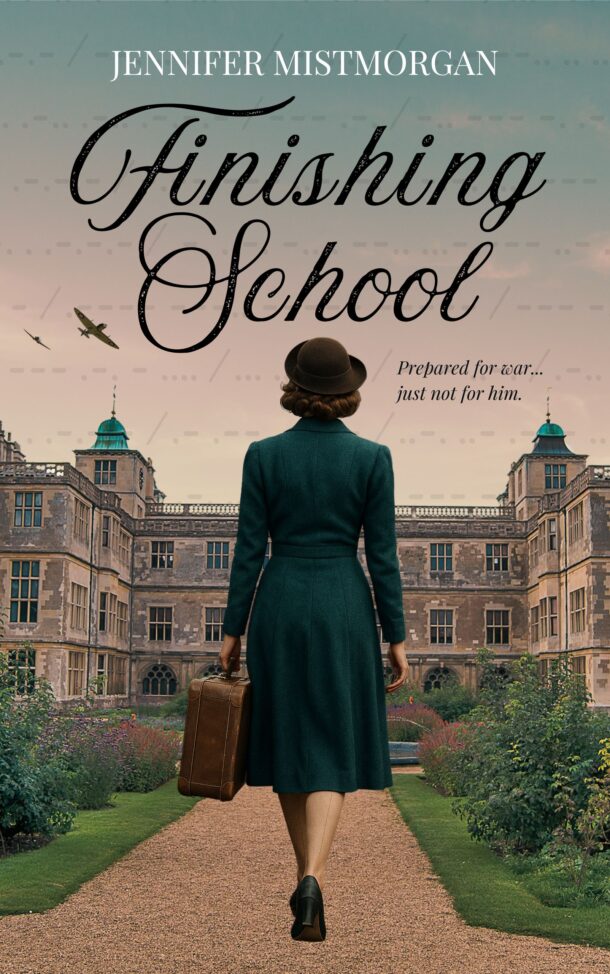The man who inspired my first book
The real story of the war doesn’t lie on the battlefield, it lies in the millions of little stories of human lives intersecting with a world at war. Read the StoryIn a speech on the BBC in 1940s, Winston Churchill said this:
This is no war of chieftains or of princes, of dynasties or national ambition; it is a war of peoples and of causes. There are vast numbers, not only in this island but in every land, who will render faithful service in this war but whose names will never be known, whose deeds will never be recorded. This is a war of the Unknown Warriors; but let all strive without failing in faith or in duty, and the dark curse of Hitler will be lifted from our age.
My grandfather is one of those unknown warriors. He served with Bomber Command during the war, piloting the iconic Avro Lancasters over Europe. And he is the inspiration for Heart in the Clouds.

RNZAF Pilot Officer Allan Fisher, 1944
Pilot Officer Allan Fisher, RNZAF
My grandfather grew up on a dairy farm in Manunui on the North Island of New Zealand. Family lore says that he enlisted in order to escape his farm life, and his particularly mean older brother. He train as a pilot in NZ and Australia with the Empire Air Training Scheme and ended up being posted overseas. He was en route to Singapore when it fell to the Japanese Imperial Forces, and so ended up in Lincolnshire, England flying with a Royal Australian Air Force (RAAF) 467 squadron. Like Alec in Heart in the Clouds, he was an enlisted pilot, who was offered a commission during his tour. However, he was medically discharged in 1944 due to persistent bronchitis.
Bomber Command
For pilots like him, life at Bomber Command lurched between downright terrifying and utterly banal. Some nights he was just a regular guy at the pub. Some nights (after the US entered the war, the RAF only flew operations at night) he flew in dark, sub-zero conditions.
He and his crew of six others flew low and slow, often through heavy enemy fire until they reached their target. The hulking aircraft was sluggish and hard to manoeuvre when it was laden with explosives. Once the bombs were gone, the pilots often had to hold steady for thirty seconds to check the bombs hit their targets, still under enemy fire. Only then, could they take evasive action and high tail home.
It was treacherous work. Half the men who flew with Bomber Command died. The ones that didn’t watched many of their friends fall from the sky. The survival rate was so dire that all the surviving pilots like my grandfather received Distinguished Flying Crosses at the end of the war – just for getting through. None of the men flying had any say in the targets or technologies used, but many who survived lived with the guilt of having done some morally questionable things, like drop incendiary bombs on sleeping civilians.
In Australia, we often think about the trench warfare of WWI or the doomed offensive at Gallipoli as epitomising the waste of human life, but I think it applies to Bomber Command as well. These men were young: 18 and 19 years old, in the early twenties at best. Perhaps the losses weren’t as stark as in WWI, but it still moves me beyond words to think of the lives cut short in their prime or indelibly affected during those years.
So many ‘unknown warriors’
My grandfather’s story is just one of many. And it’s the sheer number of stories like his that fascinate and inspire me to write about this period. Those years in the 1940s were a period of global change, of massive movement of people around the globe, of people taking on new jobs, of women stepping out of the home and gaining independence, of courage on every level, of cowardice too.
All parts of life in all parts of the world were affected by this truly global conflict. Asia, Africa, Europe. The impact of war was felt everywhere thanks to the ambitions of the Axis powers for total world domination.
As a writer, this sets my imagination on fire!
My brain almost short circuits at the number of possibilities….”Submarine attacks in Sydney Harbour? There’s a romance in that for sure…What? Hitler had a wine cellar full of the looted French wines? I must write about that…You’re kidding! There was a secret map-making facility in a Buckinghamshire country house that no one knew about until the 1990s? Best. Setting. Ever.”
In fact, I will probably never write every WWII story that I have in my ideas file because almost every sentence I read about it inspires some idea for epic conflict, tension or romance!
Heart in the Clouds
My grandfather’s experience during the war inspired the setting for my first book, Heart in the Clouds. I wanted to honour my grandfather’s experience by representing life on a Bomber Command Air Station. My hero, Alec Thomas, is a Lancaster pilot who looks like Clark Gable (just like I think my Grandfather did). He lives that terrible see-saw between terror and banality and it wears at his soul.
He has complete confidence in his own abilities – in the air and with women! – until a WAAF Radio Operator causes him to question everything. You can read more about my first book is this series here or stay in touch with the book’s path to publication by signing up to my newsletter below.

